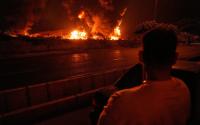26 July 2006
On Tuesday, Palestinian factions including Hamas and Islamic Jihad agreed to stop firing rockets at Israel and to free captured Israeli soldier Corporal Gilad Shalit in exchange for the release of Palestinian prisoners held in Israel and an end to Israeli attacks. Israel and Hamas's exiled leaders in Syria, have not agreed to the deal. [includes rush transcript] The UN’s top humanitarian official Jan Egeland is accusing the Israeli military of using a disproportionate amount of force in Gaza. Over the past month more than 100 Palestinians have been killed. Earlier today Israeli forces killed seven Palestinians – including a three-year-old girl.
Egeland also criticized Israel for targeting the Palestinian civilian infrastructure, including Gaza’s only power plant.
On Tuesday, Palestinian factions including Hamas and Islamic Jihad agreed to stop firing rockets at Israel and to free captured Israeli soldier Corporal Gilad Shalit in exchange for the release of Palestinian prisoners held in Israel. Israel and Hamas' exiled leaders in Syria have not agreed to the deal.
In other developments, the Israeli human rights group B'Tselem has accused the Israeli army of using Palestinian civilians as human shields in an operation in the northern town of Beit Hanoun last week. To discuss these issues we are joined on the phone by Dr. Mustafa Barghouti. Dr. Mustafa Barghouti, secretary general of the Palestinian National Initiative, President of the Palestinian Medical Relief Committee.RUSH TRANSCRIPT
AMY GOODMAN: We're joined on the phone right now by Dr. Mustafa Barghouti. He is the Secretary General of the Palestinian National Initiative and President of the Palestinian Medical Relief Committee. Welcome to Democracy Now!
DR. MUSTAFA BARGHOUTI: Thank you.
AMY GOODMAN: It’s good to have you with us.
DR. MUSTAFA BARGHOUTI: It’s nice to be with you again.
AMY GOODMAN: Can you first respond to this news that there may be some deal worked out for the release of the Israeli soldier?
DR. MUSTAFA BARGHOUTI: Yes, absolutely. There is a deal, and this deal is accepted by Palestinian groups, and there are certain international mediators that have been mediating to conclude it with Egypt. And the deal is about releasing the Israeli soldiers, and in exchange for releasing a small limited number of Palestinian prisoners, with a promise that a bigger number will be released out of the 10,000 Palestinian prisoners that include 150 women and 450 children, and to have complete and total bilateral ceasefire, which means Israel would stop completely bombarding Gaza, take out its troops from Gaza Strip, and Palestinians would abstain from any form of military action. I think it's a great deal. I don't know why the Israelis do not want to implement it.
AMY GOODMAN: So Israel has not agreed to this?
DR. MUSTAFA BARGHOUTI: No, up to now Israel refuses to agree. And we believe that Israel has before spoiled every existing ceasefire by continuing their assassination attacks and the bombardment of places in West Bank and Gaza. And the world does not know that there was a time of three months when Palestinians completely abstained from any form of military action, and Israel continued their attacks, like they did today.
Today the Israeli attack has taken the lives, not of seven people, as you have mentioned, but of thirteen people. And that brings the total death toll in Palestine by the most recent Israeli operations in Gaza and the West Bank, it brings it up to 241, actually. 241 people have been killed, mostly civilians, mostly children and women.
AMY GOODMAN: Secretary of State Condoleezza Rice went to Ramallah to meet with Mahmoud Abbas. There was a protest of hundreds outside. Can you talk about the position of the United States and the position of the people who are protesting?
DR. MUSTAFA BARGHOUTI: Well, I don't think that the people were protesting against the United States. Nobody has or wants to be in animosity with the United States. This is not the case on the Palestinian side. But people were protesting the bias of the American position to Israel, this total bias that is unprecedented and that is paralyzing the ability of the United States to play a constructive role in the Middle East.
We believe that the positions that the United States administration has taken are so biased to Israel and so supportive of Israel that, in our opinion, it even contradicts the national interest of the United States itself. And we don't understand how -- maybe the people are -- it's difficult for people here to understand how a lobby can be so powerful, in the case of the United States, to the level of making a country take decisions that are counterproductive to even its own national interest.
But we know one thing, that the United States can play a constructive role in one particular manner, and that is in pressuring Israel to accept international law and apply international law. If there is a country in the world at this very moment that can pressure Israel to follow international law and human rights regulations, it is the United States, because without the United States, Israel has no ability to continue this military operation.
Israel has been acting with a sense of complete impunity to international law and to generally accepted human rights values by the destruction it is creating in Lebanon, the destruction it has been creating systematically in the West Bank and Gaza Strip, and by violating every existing international law that comes to the issue of occupation. And now they are even attacking the UN observers. I don't think there's any country in the world that dares to do these things, except Israel.
And I think the United States must practice its ability to pressure Israel, and the big question that we have is why the United States still does not accept our call for having an international peace conference to proceed with a truthful peace process, to put all the issues on the table, to end the long standing problem of occupation that has been there for almost 40 years, and to pave the road for a solution. This is why the people were demonstrating there.
AMY GOODMAN: Dr. Mustafa Barghouti, I want to thank you very much for being with us, Secretary General of the Palestinian National Initiative, speaking to us from Ramallah, from the West Bank.






